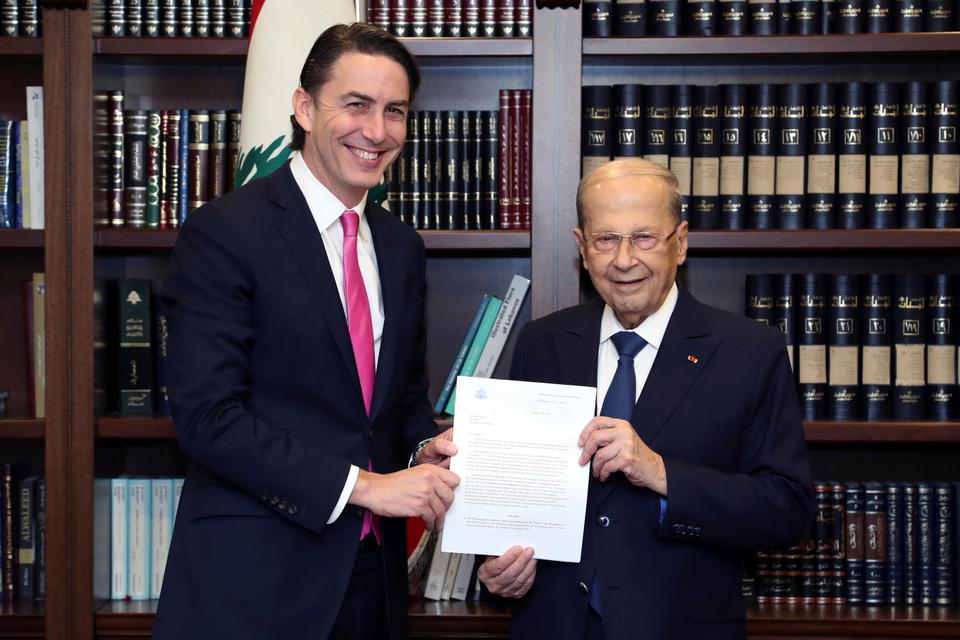The militant group known to hold much sway in Lebanon’s internal and external affairs is willing to put aside land and ideological disputes with its avowed enemy Israel. But there is an elephant in the room.
Long-time rivals Lebanon and Israel have agreed on a historic maritime deal brokered by the US, paving the way for crucial offshore energy exploration and a thaw between the two rivals.
But the situation in Lebanon is complex. Hezbollah, a US-designated terrorist group often at odds with Tel Aviv, has a strong military presence and holds much sway over the internal and external affairs of Beirut.
Although Hassan Nasrallah, the secretary-general of Hezbollah, publicly endorsed the deal on Saturday, hailing it as a victory, there are underlying tensions that have the potential to morph into a bigger obstacle for the deal to come to fruition.
The first area of tension is the question of Lebanon normalising ties with Israel -- a prospect that stands in total contrast with Hezbollah's founding principles.
Secondly, Hezbollah steers clear of any linkage between the gas deal and rapprochement with Israel.
However, regional experts are optimistic about the future of the deal.
Heiko Wimmen, project director for Iraq, Syria and Lebanon at the International Crisis Group, does not think the agreement faces any sabotage threat by Hezbollah. “I do not think Hezbollah spoils for the sake of spoiling,” he tells TRT World.
“They had an interest to have this done, so now they have an interest not to spoil it.”
Wimmen says Hezbollah has been making it clear for months that it stands behind the Lebanese government on the agreement, basically stiffening the government’s back.Randa Slim, a senior fellow at the Middle East Institute, too, says Hezbollah does not appear to be interested in playing the spoiler at this point, but if the US would continue with its mediation role between Israel and Hezbollah on their disputed land borders, then “we might see a different posturing from Hezbollah”.
“The stakes are higher for Hezbollah when it comes to land borders between Lebanon and Israel,” she says.
Israeli Energy Ministry Director General Lior Schillat stands for a photograph with the Israeli negotiation team, after the US-brokered deal setting a maritime border between Israel and Lebanon, in Rosh Hanikra, northern Israel October 27, 2022. (Reuters)
The US-brokered agreement is unique in many ways, as Israel and Lebanon never held a bilateral meeting or spoke with each other during the process of negotiations that have been ongoing for many months.
Rather, both countries signed the agreement separately in the presence of US officials. One would wonder, what made the deal possible?
Wimmen says the answer is the Ukraine-Russia conflict and the resulting gas shortage in its wake. “The Ukraine crisis has created this huge demand for gas. The Israelis want to fill that gap,” he says.
Opportunity in crisis
The energy exploration deal comes with much-needed security for Israelis vis-a-vis Hezbollah and allows the country to “push full steam ahead with their gas projects”.“They have security. They can tell investors there is no more threat from Hezbollah and plan accordingly,” Wimmen says, adding that it is something of high importance.
“If you want to fill the gap in European gas supplies that the Ukraine war created, you need to be there now. You need to have this gas now. If it is (going to be) in five years, then somebody else will have taken that market share.”
As for Lebanon, which is still reeling from the effects of the 2019 financial meltdown that pushed more than 80 percent of the country’s population into poverty, the deal shows the government and Hezbollah as trying to take the country out of the crisis.

While Beirut may not be able to benefit from the potential gas resources in the immediate future, the prospect of the availability of such reserves is a ray of hope.
“There is no electricity in Lebanon, for instance. So, if they have their own gas, they can make their own electricity and no longer be dependent on fuel imports,” Wimmen says.
Slim, who is also the director of conflict resolution and Track I II dialogues programme at the Middle East Institute, says the economic crisis in Lebanon incentivised every political actor including Hezbollah to sign off on the deal.
“No one wanted to be perceived as presenting an obstacle to Lebanon benefiting from potential gas revenues,” she tells TRT World.
Lebanon and Israel have been locked in a row over a maritime area of 860 square kilometres rich in gas and oil, according to maps sent by both countries to the United Nations in 2011.
Could the gas exploration deal pave the way for the resolution of conflicts between the two countries? Both Wimmen and Slim say it is premature to think so.
“I think it is very clear that in Lebanon there is a very strong political force, which is Hezbollah, but also allies of Hezbollah, who very clearly do not want any form of cooperation with Israel,” says Wimmen.
“It has been made very clear that this agreement is not going to amount to anything that can be called normalisation of relations.”
“It is too early to speculate about the long-term implications of this deal. This deal is transactional, issue-specific and does not resolve the fundamentals of the conflictual relationship between the two sides,” Slim says.
Social media is bold.
Social media is young.
Social media raises questions.
Social media is not satisfied with an answer.
Social media looks at the big picture.
Social media is interested in every detail.
social media is curious.
Social media is free.
Social media is irreplaceable.
But never irrelevant.
Social media is you.
(With input from news agency language)
If you like this story, share it with a friend!
We are a non-profit organization. Help us financially to keep our journalism free from government and corporate pressure .













0 Comments